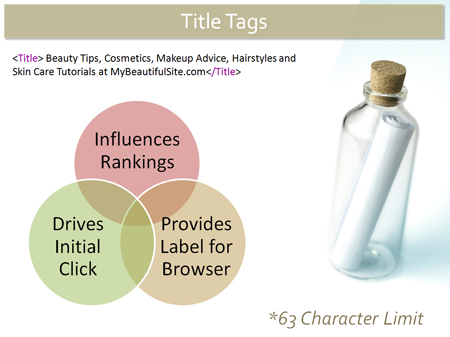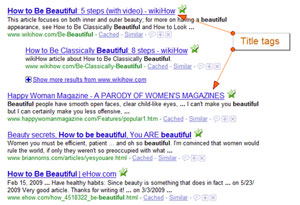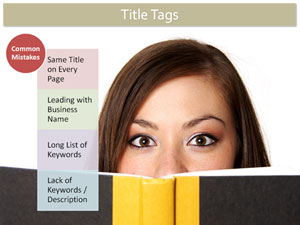The following series is pulled from a presentation Stoney deGeyter gave to a group of beauty bloggers hosted by L'Oreal in New York. Most of the presentation is geared toward how to make a blog more search engine and user-friendly, however I will expand many of the concepts here to include tips and strategies for sites selling products or services across all industries.
On-Page Optimization

A website can do just fine online without SEO. PPC, social media and other properly implemented off-line marketing efforts can really help a site succeed online with little or no SEO. But unless and until you begin to SEO your site it will always under perform, never quite reaching its fullest potential. Without SEO, you'll always be missing out on a great deal of targeted traffic that the other avenues cannot make up for.
So where do we start? SEO can be so broad and vast that we often don't know where we should begin, what will give us the greatest impact, and how to move forward. That's what I hope to answer here.
Building Good Title Tags

The title tag is the single most important piece of SEO real estate on your site. A title tag can be as long as you want, but you only have about 63 characters before the search engines cut it off. So use it wisely.
Since the title appears as the clickable link in the SERPs pages it has to be able to meet a couple of different demands.
Keyword rich
Searchers type in specific words into the search engines and they expect the engines to provide results that match their original query. We know that the search engines look at over 200 different signals to determine the relevance of any page against the keyword searched. The title tag one of them, but a very key one at that. You don't necessarily need your keyword in the title tag for it to come up in the search results, but it helps a great deal.
 But what about the visitor? What does the searcher see? Let say a searcher types "how to be beautiful" into the search engine and two results are displayed. One reads "How to Look Good and Feel Great" and another reads "How to Look Beautiful Even When you Don't Feel Like It." Which of these two is more likely to be clicked by the visitor?
But what about the visitor? What does the searcher see? Let say a searcher types "how to be beautiful" into the search engine and two results are displayed. One reads "How to Look Good and Feel Great" and another reads "How to Look Beautiful Even When you Don't Feel Like It." Which of these two is more likely to be clicked by the visitor?
It's entirely likely both pages address the same concerns, but only one uses the searched keyword. More than likely, the second result will get far more clicks than the first, even if it is in a lower position in the results (which isn't likely, but lets pretend anyway.)
Compelling
The next thing your title tag needs to be is compelling. We looked out how to make it more likely to be clicked simply by putting keywords in it, but that itself is only part of the issue. Going back to our example above if we put the first non-keyword using headline up against a third keyword rich headline of "Sexy and Beautiful, Today's Hottest Stars." which do you think will gain more clicks? My guess is the first one that doesn't use keywords because it is far more compelling and speaks more toward the searcher's intent. So in this situation the third headline is likely to rank higher but will receive fewer clicks.
The trick is to make sure that the title tag is both keyword rich and compelling. This will help move your site to the top of the rankings, but also ensure that visitors are more likely to click on it into your site.
Common mistakes
 Implementing your title tags properly is crucial to ensuring they are effective. There are a number of easy mistakes that you can make if you don't take the time to do it right. It's easy to want to blast through your title tags, especially if you have a lot of pages. But because the title tag is so important, you want to take care in developing them properly. Here are a few common issues:
Implementing your title tags properly is crucial to ensuring they are effective. There are a number of easy mistakes that you can make if you don't take the time to do it right. It's easy to want to blast through your title tags, especially if you have a lot of pages. But because the title tag is so important, you want to take care in developing them properly. Here are a few common issues:
Same on Every Page: Each page in your site is unique, or at least it should be. This means your title tags should be unique on each page as well. On a lot of sites you'll see the same title tag across all the pages "Welcome to My Site, or something like that. That hardly describes the page at all. And show that in the search results, you're not likely to get any clicks. Go through the site and customize each title, ensuring it uniquely and accurately describes the content of the page.
Leading with Business Name: There are good reasons to have your business name present in your title tag, but that should not be by default. If you use your business name be sure to think through the reasoning and make sure it's sound. The limitations of the title tag make using your business name something you do only with great care and consideration. I'll discuss this more in a bit.
List of Keywords: Wanting to get your keywords in the title tag makes it tempting to just try to throw as many in there as you possible can. "Beauty | Makeup | Makeovers | Diet | Healthy Skin." Sure that gets all your keywords in there but does nothing to make someone want to click on the result. This means that (gasp!) you have to use keywords sparingly so you can also make the title something worth clicking on.
Lack of Description: Aside from getting your primary keywords in the title, and making it compelling, you also have to make sure the title tag provides enough of a description of the content to ensure it gets a targeted click. No sense having someone click into the site only to find the information on the page isn't what they expected. Make sure that the title describes the content in a compelling and keyword friendly way.
Branded titles
 So let's address using your business name in your title tags. As I said earlier, sometimes its wise but that shouldn't be the default position.
So let's address using your business name in your title tags. As I said earlier, sometimes its wise but that shouldn't be the default position.
In general, you can place your business name either at the front or the rear of the title tag. My rule of thumb is that you don't want to put your business name at the front of your title tag unless you have a highly recognizable brand name that the visitor will know and will likely be a click-generator from the search results. If that's not the case then you simply don't want to give up that real estate.
Branding at the rear of the title tag is a far better solution for most businesses. This helps moderately known or even unknown companies build brand name recognition. The downside of branding your title tags this way is you are still using up valuable real estate that might otherwise be used making a keyword rich and compelling headline. Also note, that if the title goes too long, your business name will be cut off in the search results.
Most of the time you don't need your business name in your title tags at all, however there is one time when I would suggest leaving it off almost 90% of the time. This is on product pages. It's so crucial to get important product data into the title tag that there often simply isn't room enough for your business name. Again, I might make an exception for well-known business names, but default to showing product info first and foremost.
Read the SEO 101 Part 1.




